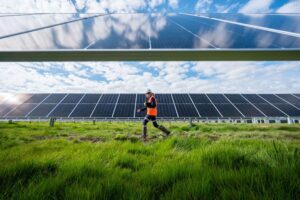One of the standard testing procedures for lithium batteries is stabbing them with a large nail to see if they explode.
It’s a test that Australian battery maker Li-S Energy says it has successfully completed or its semi-solid lithium sulfur cells. In other words, it didn’t explode.
The company tested 28 of the smaller Phase 2, 2.5Ah cells after its aerospace partners, including Queensland company V-TOL Aerospace, asked it to put them through the damage testing process.
“Our test results significantly exceeded UL2271, UL2580 and the United States Military Performance Specifications MIL-PRF32383/4X with the cells showing no leakage, no venting, fire or flame, no rupture, no explosion, no exothermic reaction or thermal runaway,” says Li-S Energy CTO Dr Steve Rowlands.
Li-S Energy has developed a twenty-layer battery cell using its third-generation (GEN3) semi-solid state lithium sulfur technology which packs in 45 per cent more energy density and is safer and more reliable.
Public worries about the safety of lithium-ion batteries are rising, driven by a series of fatalities caused by e-bike and e-scooter fires and reports of car fires.
These fears were added to this week, when a New South Wales inquiry into electric vehicle batteries was told that people could be left to die in electric car accidents if it looked like a battery was likely to explode.
“Amid growing public concern about the safety of lithium-ion batteries and battery fires, delivering a safe battery is vitally important,” says CEO Lee Finniear.
“In our target markets of drones, electric aircraft and defence, a battery fire could be catastrophic, and these results show our partners that Li-S Energy battery cells are safe when penetrated and continue to work even after being damaged.”
The latest nail test results suggest the Li-S Energy batteries have a better safety profile than regular lithium ion batteries, says V-TOL Aerospace chief Mark Xavier.
The military-level standard requires the batteries to not explode and to short out without creating any kind of flammable fizzle, and are tested at a range of different electrical currents.
New tests to include altitude, being dropped
Li-S has a new battery testing centre in Geelong, Victoria, which is where it’s able to test batteries at different levels of charge and cell age.
The kinds of tests will include crushing, external short circuit, being dropped, vibration, testing at high altitude, and tolerance to heat and cold.
Li-S Energy’s new Phase 3 production line will be commissioned in the coming months which will allow it to ramp up battery production.
The current facility – Phase 2 – is where the tested batteries were made, using a low-flammability electrolyte which the company says will make them safer than traditional lithium sulfur and lithium-ion battery cells.
Using its patented Li-nanomesh technology, the cells incorporate Boron Nitride Nanotubes (BNNTs) into the cell construction to reduce dendrite growth, which improves both safety and the life cycle of the battery.
That’s because dendrites, projections of metal that build up on the lithium surface of cells and penetrate into the solid electrolyte, eventually cross from one electrode to the other, shorting the cell.









